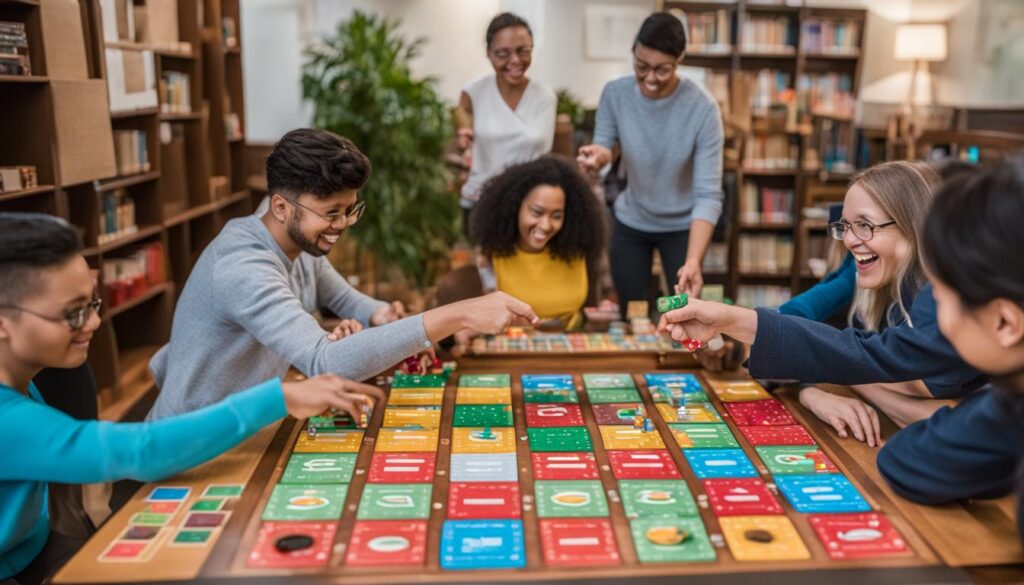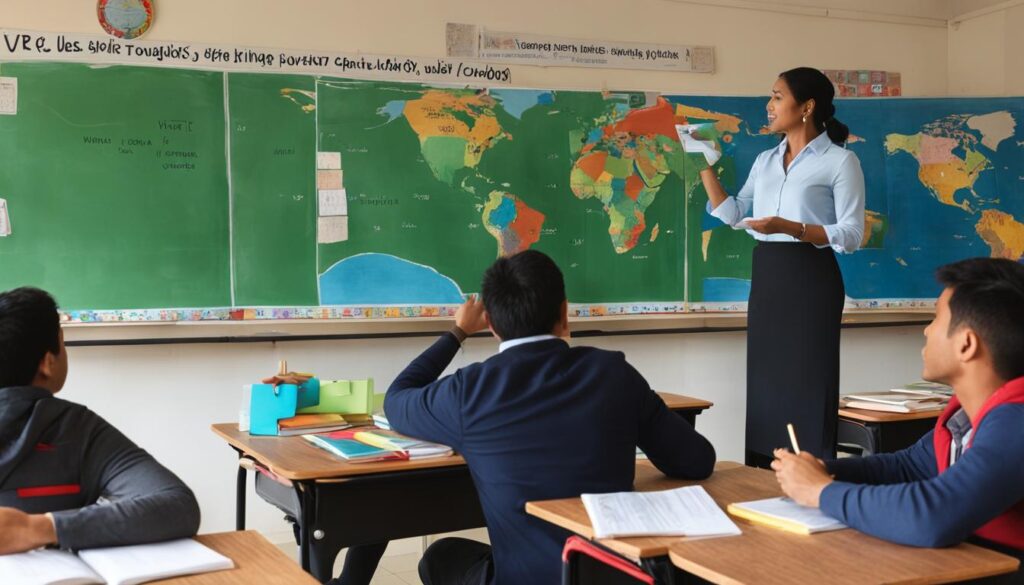What are some creative ways to learn a new language for travel? Whether you’re preparing for a backpacking adventure, a business trip, or simply want to connect with locals, there are plenty of language learning techniques and resources to choose from. In this section, we’ll explore various methods to help you master a foreign language before your next adventure abroad. From immersive programs to language learning apps and games, we’ll guide you through the best resources available to enhance your language skills. Let’s get started!
Immersive Language Learning Programs
Immerse yourself in the language and culture to quickly improve your language skills. Immersive language learning programs are designed to provide an authentic environment that mimics real-life situations; this strengthens your speaking and listening skills. Many programs offer cultural experiences that can enhance your overall language learning journey.
| Program | Location | Features |
|---|---|---|
| Spanish Abroad | Spain, Mexico, Costa Rica, Peru, Ecuador, Argentina | Homestays, cultural excursions, conversation exchanges |
| Center for Study Abroad (CSA) | France, Italy, Spain, Costa Rica, Mexico, Ecuador, Chile, China | Homestays, language courses for all levels, cultural activities, excursions |
| Language Immersion Institute (LII) | Beijing, Shanghai, Dalian, Xi’an, Hong Kong | Cultural activities, language courses, language practice with locals |
These programs often offer language exchanges with native speakers, providing you with an opportunity to interact and exchange language knowledge. Additionally, many immersive programs include experiential learning, where learning takes place outside the classroom setting. This practical, hands-on approach to language learning not only improves your language proficiency, but it also promotes personal growth and development.
Immersion programs provide an unparalleled opportunity to practice and refine your language skills in an authentic environment while experiencing the culture firsthand.
Benefits of Immersive Language Learning Programs
- Real-life language practice
- Cultural immersion
- In-person instruction
- Language exchanges with native speakers
- Experiential learning
Immersive language learning programs give you the opportunity to practice and improve your language skills in the context of daily life, enhancing your overall cultural experience.
Immersive language learning programs can be expensive, but scholarships and grants are often available to help cover the costs. As with any educational program, it’s essential to research and compare your options to find the program that best suits your language learning goals and budget.
Language Learning Apps and Websites
Learning a new language has never been easier, with a plethora of language learning apps and websites available at your fingertips. These platforms provide interactive lessons, vocabulary drills, and language practice exercises, allowing you to learn at your own pace.
Some popular language learning apps include:
- Duolingo
- Rosetta Stone
- Babbel
- Memrise
Language learning websites offer a wealth of resources, including grammar explanations, vocabulary lists, and audio-visual materials. Some of the most effective language learning websites include:
- FluentU
- Busuu
- iTalki
- Lingoda
Language Learning Communities
Language learning communities are another valuable resource for language learners. These communities allow you to connect with other learners and native speakers for language exchange. By communicating with native speakers, you can practice your language skills and gain a better understanding of the culture that surrounds the language you’re learning.
Some popular language learning communities include:
- Tandem
- HiNative
- Language Exchange
- Mightyverse
Joining a language learning community is a great way to make new friends and learn a language in a supportive and collaborative environment.
Whether you prefer using an app, website, or language learning community, these resources can accelerate your language learning progress and enhance your overall language skills.
Language Learning Games and Activities
Learning a new language can be incredibly exciting and enjoyable when you use language learning games and activities. Not only do they help you improve your language skills, but they also make the process more engaging and fun. Below are some language learning games and activities that you can try:
Interactive Games
Interactive games are an excellent way to practice your language skills in a fun and engaging way. Many language learning apps offer a variety of games that help you improve your vocabulary, grammar, and listening skills. Some popular language learning games are Duolingo, Rosetta Stone, and Babbel.
Language Learning Challenges
Challenges provide you with a goal to work towards and can help you stay motivated. You can challenge yourself to learn a new word every day, write a short paragraph in the language, or have a conversation with a native speaker. Some language learning challenges can also be found on social media platforms.
Other Activities
There are other fun activities you can do to improve your language skills. Watching movies or TV shows in the language that you are learning is a great way to practice listening skills. You can also listen to podcasts or songs in the language. Additionally, joining language learning communities and participating in language exchanges with native speakers can enhance your language learning experience.
Incorporating language learning games and activities into your language learning routine can help you stay motivated and make the process more enjoyable. Try out different games and activities to find ones that work best for you!
Language Learning Classes and Courses
If you thrive in a structured learning environment, attending language learning classes and courses might be the ideal choice for you. In-person lessons, online courses, and intensive language programs are effective ways to receive comprehensive instruction and practice speaking with fellow learners.
Online courses provide the flexibility to learn at your own pace from the comfort of your home. They offer interactive learning materials, such as videos, quizzes, and exercises, that cover various language skills. Online courses are ideal for learners who want to study on their own schedule but still receive structured guidance.
In-person lessons are beneficial for learners who prefer face-to-face interaction with instructors and other students. Language schools, community colleges, and cultural centers often offer language classes taught by certified instructors. These classes provide structured lessons and opportunities to practice speaking with classmates and teachers.
Intensive language programs are immersive language learning experiences that typically span several weeks or months. These programs provide intensive language instruction, cultural immersion, and language practice with native speakers. They are ideal for learners who want to make the most of their learning experience and gain fluency in a shorter period.
Types of Language Classes
| Class Type | Description |
|---|---|
| Group Classes | Structured classes taught by certified instructors in a classroom setting where you practice speaking with fellow students. |
| Private Lessons | One-on-one instruction with a certified language tutor. |
| Online Courses | Interactive courses that use videos, quizzes, and exercises to provide guided language instruction. |
| Intensive Programs | Immersive language programs that provide intensive language instruction, cultural immersion, and language practice with native speakers. |
Language learning classes and courses are excellent resources for learners who thrive in structured learning environments. With online courses, in-person lessons, and intensive language programs, you can find the perfect learning option for your language learning journey.
Language Exchange Programs
If you want to practice speaking with native speakers while also helping others learn your native language, language exchange programs are a great option. These programs provide you with an opportunity to have conversations with a language partner who is fluent in the language you want to learn. In return, you can teach them your native language.
Language exchange programs can take many forms, from in-person exchanges to virtual chat partners. You can find language exchange programs through online communities or language learning apps. Some popular language exchange apps include Tandem, HelloTalk, and Speaky.
When looking for a language exchange partner, it’s important to find someone who is at a similar level of proficiency in the language you want to learn. You should also establish clear expectations at the outset, including how often you will meet and what topics you want to discuss.
One way to ensure a successful language exchange is to structure your conversations around specific topics. This will help you learn new vocabulary while also improving your speaking skills. For example, if you are learning French and want to discuss travel, you could make a list of common travel expressions and practice using them in a conversation with your language partner.
Language exchange programs are a valuable resource for language learners, providing an opportunity to practice speaking with native speakers and improve your language skills. Whether you prefer in-person exchanges or virtual language partners, there are a variety of language exchange programs available to suit your needs.
Cultural Immersion and Travel
Traveling to a country where the language you’re learning is spoken is one of the most effective language learning techniques. By immersing yourself in the culture and traditions of the country, you have the opportunity to interact with locals and experience authentic language use. This cultural immersion provides a deeper understanding of the language within its cultural context and can greatly improve your language learning journey.
One of the key benefits of cultural immersion is the opportunity to practice speaking with native speakers in real-life situations. By speaking with locals, you can refine your pronunciation, grammar, and vocabulary in a natural way. Additionally, cultural immersion allows you to gain a deeper appreciation of the language’s nuances, such as idioms and expressions, that may not be taught in traditional language learning resources.
Traveling to a foreign country can also be a fun and engaging way to learn a new language. You can explore local attractions, taste regional cuisine, and participate in cultural activities that will enrich your language learning experience. By embracing the local culture, you may find it easier to immerse yourself in the language and make faster progress.
Before traveling, it’s important to prepare yourself by learning basic phrases and vocabulary. Language guides and apps can provide helpful resources to prepare for your trip, and there are many language learning resources available for use while abroad, such as language exchange programs and local language classes.
Language Learning Resources
When it comes to language learning, having access to the right resources can make all the difference in your progress. From textbooks to podcasts, there are a plethora of language learning resources available to aid your language learning journey. Here are some of the most valuable resources for language learners:
| Resource | Description |
|---|---|
| Textbooks | Textbooks provide structured language instruction with clear explanations and practice exercises. They are a great resource for beginners and intermediate learners looking to solidify their language foundation. |
| Online Resources | The internet is a treasure trove of language learning resources. Websites like Duolingo, Memrise, and Rosetta Stone offer interactive language lessons and vocabulary drills. YouTube also has numerous language learning channels, such as Easy Languages and Learn French with Vincent, that provide engaging video lessons. |
| Language Learning Blogs and Podcasts | Blogs and podcasts are a great way to supplement your language learning. There are numerous language learning blogs and podcasts that provide tips, resources, and cultural insights to aid language learners. Try checking out FluentU, All Language Resources, and The Fluent Show. |
| Language Learning Apps | Language learning apps, such as Babbel and Lingodeer, provide convenient language instruction on-the-go. With intuitive interfaces and interactive lessons, they allow you to learn at your own pace and practice your language skills anytime, anywhere. |
By utilizing these language learning resources, you can enhance your language skills and supplement your language learning journey with valuable tools and materials. Keep in mind that different resources work better for different learners, so try out a few and find the ones that work best for you.
Language Learning Techniques
Learning a language requires effort, dedication, and a good strategy. In this section, we will explore different language learning techniques that can accelerate your language acquisition. Here are some proven methods to help you retain and recall new vocabulary and grammar rules:
Mnemonic Devices
A mnemonic device is a memory aid that helps you remember new information. This can be a word, phrase, or pattern that triggers your memory. For example, to remember the Italian word for “bread” (pane), you can associate it with the image of a bread pan. Mnemonic devices can be particularly helpful when memorizing vocabulary or grammar rules.
Flashcards
Flashcards are a tried-and-true method for memorizing vocabulary. You can create physical cards or use an app like Quizlet to make digital flashcards. Flashcards work by repeatedly reviewing words or phrases until they stick in your memory. You can also use them to practice translating between your native language and the language you’re learning.
Visualization Techniques
Visualization involves creating mental images to remember words or phrases. When you encounter a new word, try to create a mental image that represents it. For example, to remember the French word for “tree” (arbre), you might picture a tree with the word “arbre” written on its trunk. Visualization techniques can be especially useful for memorizing abstract concepts or grammar rules.
Spaced Repetition
Spaced repetition involves reviewing material at increasing intervals to reinforce your memory. This can be done with flashcards or using an app like Anki. The software tracks which words you know well and which ones you struggle with, and adjusts the frequency of review accordingly. Spaced repetition can be a highly effective way to commit new words or grammar rules to memory.
Sarah: “I’ve been struggling to remember new vocabulary words. How can I improve my memory?”
Alex: “Try using mnemonic devices or visualizations techniques. They can make new information more memorable and easier to recall.”
Language Learning Strategies
Learning a new language can be challenging and time-consuming. However, adopting effective language learning strategies can help you maximize your efforts and make the process more efficient. Here are some language learning techniques to get you started:
Set Specific Goals
Setting specific goals can help you stay motivated and focused on your language learning journey. Whether you want to learn basic conversational skills or become fluent, setting clear goals will help you track your progress and give you something to strive for. For example, you might set a goal to learn 10 new vocabulary words every day or to have a 10-minute conversation with a native speaker by the end of the month.
Create a Study Schedule
Consistency is key when it comes to language learning. Creating a study schedule and sticking to it can help you make progress and build a solid foundation of language skills. Determine the best time and duration for your study sessions and stick to them. Whether it’s 30 minutes a day or three hours a week, consistency will ensure that you are making steady progress towards your language learning goals.
Find a Study Group
Joining a study group can provide a valuable support system for your language learning journey. Find a group of like-minded language learners and meet regularly to practice speaking, listening, and learning together. Not only can it be a fun way to learn, but it can also help you stay accountable and motivated.
| Benefits of Study Groups: | – Improved motivation | – Shared learning experience | – Constructive feedback |
|---|---|---|---|
| – Better retention of knowledge | – Increased confidence | – Opportunity to socialize |
Keep Track of Your Progress
Tracking your progress can help you celebrate your accomplishments and identify areas that need improvement. Consider keeping a language learning journal where you can record new vocabulary, grammar rules, and sentences that you learn. You can also track your conversation skills by recording and listening back to your conversations with native speakers.
By incorporating these language learning strategies into your routine, you can optimize your language acquisition process and achieve your language learning goals more efficiently.
Conclusion
Learning a new language can be a daunting task, but it can also be an incredibly rewarding experience. By exploring creative ways to learn a new language for travel, you can enhance your travel experiences and connect with people from diverse backgrounds.
Remember to incorporate immersive experiences, such as language learning programs or cultural immersion, to practice speaking and listening skills in an authentic setting. Utilize language learning apps, websites, and resources to supplement your learning and enhance your vocabulary and grammar skills.
Participating in language exchange programs and finding study groups can provide valuable opportunities to practice speaking with native speakers. Finally, incorporating language learning techniques and strategies can help optimize your learning process and accelerate your language acquisition.
Keep in mind that language learning is a journey, and everyone’s journey is different. Find the methods that work best for you and practice consistently. With dedication and persistence, you can achieve your language learning goals and take your travel experiences to the next level.
Happy language learning!

















































